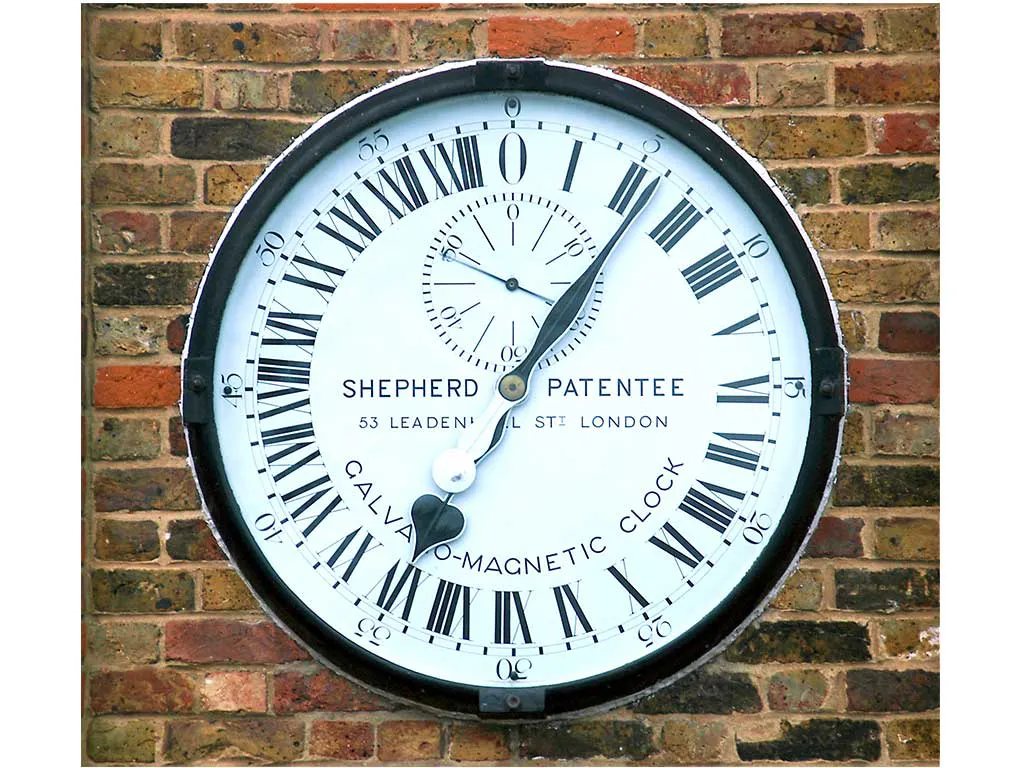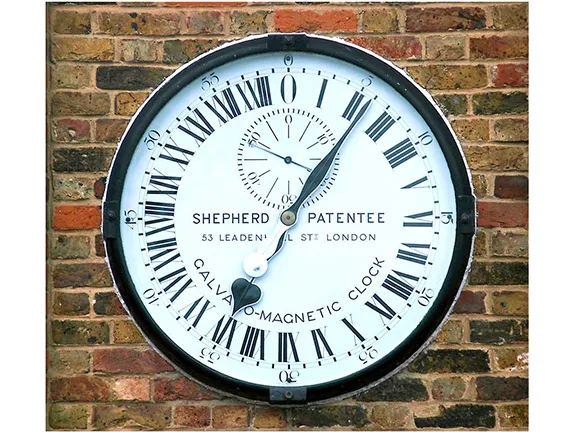The decision to put whole countries in the same time zone came about because of the railways
By Nick Nutter | Updated 24 Aug 2022 | Andalucia | History |
Login to add to YOUR Favourites or Read Later


Shepherd Gate Clock at Greenwich
Well, it’s the last Saturday in October and once again the clocks are going to move back one hour tonight, keeping Spain on Central European Time, or Greenwhich Mean Time + 1. But why do we have this custom of altering the clocks to extend the mornings or evenings? On any particular day, in any particular location, the number of hours, minutes and seconds between sunrise and sunset is exactly the same whether the clocks say sunrise is at 7am or 8am. And don’t even the experts come out with some stupid comments such as, according to Nuria Chinchilla, professor at Spain’s IESE business school, “If we don’t (change to GMT) we lengthen the day…..”. Pardon, that’s like Scottish farmers claiming their cows become confused over their milking times. It isn’t the cow that’s confused.
Why do we mess with our natural circadian rhythms? More importantly, why in Spain do we mess with them to such an extent that we are all 2 hours out of kilter, we, in Andalucia, are in the same time zone as Warsaw in Poland which is 2,300 kilometres east of us.
It used to be so simple. The first timekeeping devices, sundials and water clocks originated from ancient Egypt, and were later used by the Babylonians, the Greeks and the Chinese. Medieval Islamic water clocks were unrivalled in their sophistication until the mid-14th century. Spring driven clocks arrived in the 15th century and pendulum clocks in the 17th century. Setting those clocks was easy. On any day, when the sun was due south, at its zenith or highest point in the sky, it was noon, 12 o’ clock. Zimple, as a meerkat would say. The sundial in your garden works on the same principle.
Now assume you are living in Andalucia’s easternmost town, San Juan de los Terreros and you have a friend who lives in Ayamonte. You are on Messenger and you compare your sundial time with that of your friend. Your sundial says it is 1pm exactly, your friend in Ayamonte reckons it is still 23 minutes to 1. (I have rounded the numbers to make it easier. The longitude at San Juan de los Terreros is 1.6579° W, that of Ayamonte 7.4043° W.). Furthermore, if you conducted this exercise during the summer, your kitchen clock would tell you it was 3pm in both San Juan de los Terreros and in Ayamonte and 2pm if you did the exercise during the winter. What is going on?
We have shown that the sun not only works, it knows what it is doing. Which is more than can be said for the EU commission that was set up in 2018 to look at allowing member states to observe their own choice of time year-round. Not surprisingly, no decision has yet been reached. They claim they have not had enough time, what with Covid and all.
The decision to put whole countries in the same time zone came about because of the railways. When it took a few days to travel between London and Exeter it did not really matter that you passed through a few local time zones. Fourteen, one minute time zones to be precise, London is 14 minutes ahead of Exeter according to the sun. In 1880 Parliament decreed that all clocks in the UK would be set to Greenwich Mean Time so that the trains could all run on time. GMT was adopted by the United States in 1883 and in 1884 the Greenwich Meridian was adopted worldwide as the reference point from which all the 24 time zones were created.
In 1907, English builder William Willett published a pamphlet called ‘The Waste of Daylight’, campaigning to advance clocks at the beginning of the spring and summer months and to return to GMT in the autumn. He wanted to encourage people to get out of bed earlier in summer. Parliament tried to introduce a Daylight Saving Bill in 1908 but the House of Commons rejected the bill. However, in 1916, the ‘Summer Time Act’ advanced the clocks in the UK for 1 hour from May 21 until October 1 in the same year. By that time Willett was dead, perhaps he should have stuck to building because politicians worldwide have been tinkering with time ever since.
Shoot forward to the Second World War. Franco was trying to keep Spain neutral during the conflict but still wanted to curry favour with Hitler so he put Spain on the same time zone as Germany, Central European Time, which is one hour ahead of GMT. So, when summer time arrives in March, all those countries on CET find themselves 2 hours ahead of GMT, thus explaining why, in summer, noon local in Spain is 2 hours or so out of kilter with noon by the clock.
In a trial known as the British Standard Time experiment, the UK kept Daylight Saving Time hours permanently from February 1968 to November 1971. Although the experiment resulted in fewer traffic incidents because darkness fell 1 hour later on the clock, it was found that there was a slight increase in incidents in the darker morning hours. The experiment was abandoned in 1972 because of its unpopularity—particularly in the north of the country, where days are generally shorter. They discovered that what you gain at one end of the day, you lose at the other. A Scottish cow could have worked that out.
The answer to the problem is quite simple. Allow each country to choose its own time based on that countries’ longitude, in line with the EU commission’s idea. Have that as the permanent time for the entire year. Any organisations that want to utilise extra daylight hours at the beginning or end of the day, schools for example, alter their opening/closing times in March and October. I guess you would then have teachers complaining they were losing an hour’s sleep. Ho hum, you cannot please all the people all the time. On the bright side, the trains would run on time, apart from in the UK where they never have anyhow.